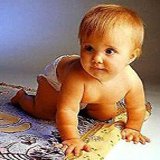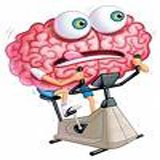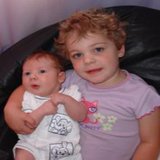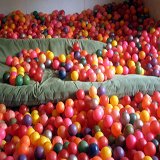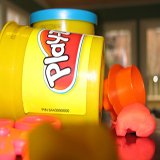Baby Development Milestones -
25 Month Old to 30 Month Old
Baby development milestones are often divided into specific domains, such as gross and fine motor movements, hand-eye coordination, language, cognition, social and emotional growth.
These designations are useful, but substantial overlap exists.
Studies have established average ages at which specific baby development milestones are reached, as well as ranges of normality.
Here you will find detail of what to expect from your baby during the 25 month old development to 30 month old development phase.
Baby Development Milestones
25 - 30 month old
Fundamental Movement Skills
- Is able to jump a short distance off the ground from a standing position and with practice may be able to jump over a low obstacle.
- Successfully maneuvers himself around obstacles while performing another task. For example, he can push a toy wheelbarrow around the room without crashing into furniture.
- Is able to take short walks on foot rather than using the buggy.
- Walks up stairs in your house without your support.
- Stands on tiptoes for a couple of seconds.
Hand Eye Coordination
- Manages to thread large beads onto a lace.
- When painting and drawing grips the crayon or brush with his fingers and is able to make a controlled mark. For example, he may be able to copy a vertical line that you have drawn.
- Copes better with construction toys and games and puzzles that have pieces that fit together.
- Can do up and undo large buttons.
- Can start to learn how to use pieces of cutlery other than his spoon.
- Has firmly established hard preference.
Language
- Adores you reading stories to him just before he goes to sleep.
- Benefits from discussing his activities with you and will get more out of a television program, for example, if you talk about it afterwards.
- Asks questions, and listens attentively to the answers.
- Has a vocabulary of several hundred individual words.
- Enjoys simple conversations with familiar adults and other children.
- Uses language to extend the complexity of imaginative play, such as dressing up.
- Starts to use pronouns such as he or you and prepositions, such as in or on
- Recalls small amounts of personal information, such as his age and full name, and is able to relate that information.
Learning
- Begins to match colours, for example, by finding two bricks of the same colour.
- Understands that coins are money, but still has little concept of their value.
- Sorts objects according to specific characteristics. He is able for example, to divide toys according to type say, animals or cars.
- Begins to develop a broad sense of time. For example he can probably distinguish between today and tomorrow.
- Identifies himself in a photograph shown to him.
- Is hungry for new experiences beyond the home and enjoys visits to new places such as the zoo.
- Ascribes human qualities to inanimate objects as an expression of his active imagination and perhaps as a means of understanding the world around him. For example, he may be worried that a favourite toy will be sad if he leaves it at home.
Social and Emotional
- May still be clingy when you leave him in someone elses care.
- Starts to learn basic social skills, such as sharing, when playing with siblings and other children.
- Takes an increasingly active part in dressing and undressing. He may pull off his socks and jumper when getting ready for bed.
- Is more keen to play with other children at times, although arguments are still common.
- Insists on trying more things on his own but may become despondent when he experiences frustration and failure.
- Is prone to toddler temper tantrums when things dont go his way.
Expert Advice
This information is presented to help parents understand what to expect from their child at a certain age.
Any questions you may have about your baby development milestones should be shared with your family doctor.
Be sure to visit all the baby development milestones pages for different ages.
Find It!
Can't remember where you read something specific? Just type in your search term in the box below and your specific topic will be returned to you instantly.





